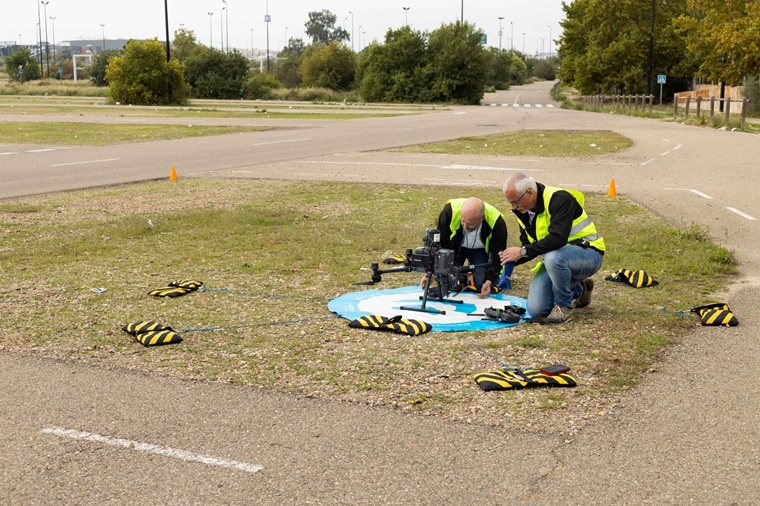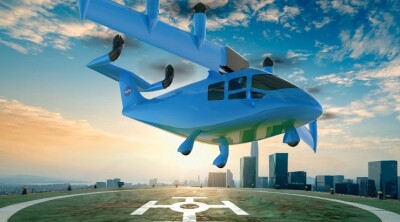U-ELCOME project, coordinated by EUROCONTROL and funded by the European Climate, Infrastructure and Environment Executive Agency (CINEA)  in cooperation with SESAR 3, shown yesterday morning on the banks of the river Ebro in Saragossa different real tests of the so-called U-space in the delivery with drones of medicines and search and rescue operations in the river Ebro.
in cooperation with SESAR 3, shown yesterday morning on the banks of the river Ebro in Saragossa different real tests of the so-called U-space in the delivery with drones of medicines and search and rescue operations in the river Ebro.
WHAT IS U-SPACE?
As Rodrigo Benedit, from the Drone Business Development Department of Enaire, the Spanish air traffic manager, explained in the presentation, ‘’U-space‘ is the European name for digital and automated services that allow protected, efficient and safe access to the same airspace for a large number of unmanned aircraft’. Benedit explained that this will be made possible by ‘two new agents in the aeronautical sector: the U-space Service Providers (USSP) and the Common Information Service Providers (CISP), acronyms with which we must begin to familiarise ourselves’.
NEW MOBILITY WILL ALSO BE WITH DRONES
The objective of U-ELCOME project is to demonstrate the safe and reliable integration of drones in airspace that will contribute to achieving the Sustainable and Intelligent Mobility Strategy by accelerating the adoption of U-Space in the urban air mobility market and services.
Saragossa is one of the 15 locations in Spain, Italy and France, which allow to accelerate the incorporation of U-space services in Europe. ‘The Zaragoza test consisted of a mixed search and rescue operation between Saragossa Fire Department and the company Umiles, simulating the search for a person in the selected area of the Ebro River. The two drones will fly and coordinate with manned boats in a joint search party,’ said Isabel Buatas, director of HERA and Expodrónica and head of communications for the U-Elcome project, who highlighted the city’s support for drone technology: “Saragossa has demonstrated how UAS technology can revolutionise urban deliveries of medical cargo by improving the efficiency, safety and sustainability of operations”.
‘In addition, a third drone operated by the company Bluenest flew a defibrillator from the south bank of the river to the north bank. The flight served as a contingency for the other user in the area, which made a safe landing and resumed the flight when the volume was safe again’, explained Darío Ares, UTM Project Manager at Bluenest.
The presentation was also attended by Fernando Castillo, CEO of Novaltia, who highlighted the pharmaceutical cooperative’s support for a technology they have been working on in recent years through their ‘Pharmadron project for the last-mile transport and distribution of medicines and other pharmaceutical products using unmanned aerial vehicles (UAS/drones) to remote and difficult-to-access areas, in adverse weather conditions and in emergencies, with a very important social purpose’.
Finally, José Miguel Rodrigo, Zaragoza City Councillor for Mobility, stressed that ‘Zaragoza wants to be at the forefront of cities that explore all their possibilities and lead the way for this type of innovation’. Rodrigo highlighted ‘the work carried out by the Fire Brigade, who have redoubled their commitment to technological innovation in the use of drones in all types of interventions, including the rescue of people, the search for missing persons and the inspection of damaged buildings.
TESTING A DAR ACTIVATION
The operation featured a BVLOS crop monitoring operation done in a rural field done by UMILES and a second drone second drone by Bluenest carrying and dropping a medical cargo.
Two flights have been scheduled and a DAR (Dynamic Airspace Reconfiguration) will be activated in the second flight to simulate the pass of a firefighter helicopter in need to recharge water in the reservoir nearby the operation area.
The objective was to test a DAR activation in an operation with two operators doing simultaneous flights. Umiles performed a BVLOS (Beyond Line of Sight) crop monitoring flight and Bluenest performed a line-of-sight drug delivery and release flight. Two flights were performed, a nominal one with the operators performing the operation and a second flight activating the DAR simulating the passage of a manned aircraft and having the two operators receive the alert from their USSP and terminate the operation to clear the way for the (simulated) manned aircraft.
Source: U-ELCOME
















Comments